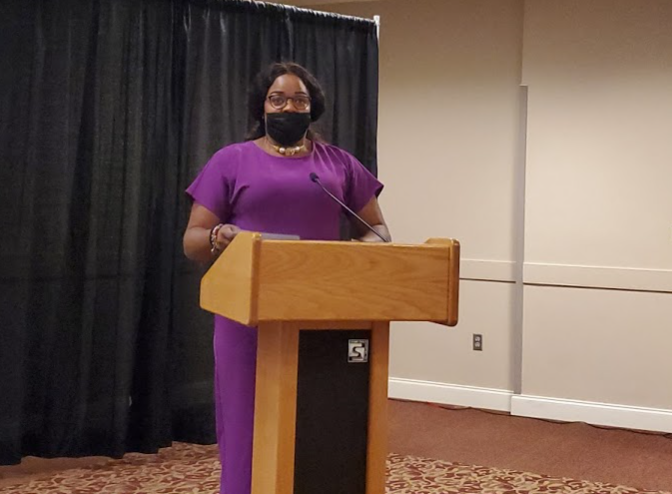
Natalie Wiley of Jacksonville was among parents and education choice advocates who spoke in favor of SB48, which would streamline state scholarship programs and provide additional flexibility for families. Three of Wiley’s children participate in scholarship programs, which she says have made a huge difference in their lives.
A bill that would simplify Florida’s education choice programs by merging five scholarships into two and add a flexible spending option advanced one more step toward passage today after clearing the Florida Senate Appropriations Subcommittee on Education.
By a vote of 6 to 3 along party lines, members approved SB48, which would transfer students receiving the Florida Tax Credit Scholarship Program (FTC) to the Family Empowerment Scholarship (FES), which was signed into law in 2019, and sunset the 20-year-old FTC.
“I am glad to see the bill will give myself, a single mother of four, and other families the opportunity to have flexibility in utilizing the scholarship,” said Natalie Wiley of Jacksonville, whose children are on FTC and FES scholarships. “This will improve programs that have made a huge impact in my family.”
The bill, sponsored by Sen. Manny Diaz Jr., R-Hialeah, was approved Feb. 3 by the Senate Education Committee. (For more information about what the bill includes, go here.) A companion bill is expected in the House.
“This bill is not an expansion but really a streamlining,” Diaz said during the subcommittee meeting. He said the pandemic amplified the need for increased innovation and flexibility, with many parents working with their kids at kitchen tables. “I still believe the parent is the best decisionmaker for the child.”
Under the bill, donors would still be allowed to contribute to the tax-credit program through a newly created state trust fund. However, donations would go to serve K-12 education generally in the state, rather than pay for scholarships. Both the FTC and the FES are income based and serve students whose families meet financial eligibility rules.
The bill does not materially change the eligibility criteria for any of the scholarship programs, and actually reduces the currently allowable statutory growth in some of the programs.
The bill also would merge the McKay Scholarship Program for Students with Disabilities and the Gardiner Scholarship Program, creating a new program for students with unique abilities called the McKay-Gardiner Scholarship Program.
That program would allow families in all state scholarship programs to have flexible spending accounts, also known as education savings accounts, or ESAs. Currently, only students enrolled in the Gardiner program have such flexibility.
The accounts allow families to spend their money on pre-approved services and equipment in addition to private school tuition. Approved expenditures include electronic devices, curriculum, part-time tutoring programs, educational supplies, equipment, and therapies that insurance programs do not cover. The bill would expand eligible services for McKay-Gardiner students to include music, art, and theater programs, as well as summer education programs.
The scholarship programs are also available to homeschool students and those enrolled in eligible private schools.
In addition, victims of bullying at district schools who transfer to private schools as part of the Hope Scholarship Program would also be served by the Family Empowerment Scholarship Program and receive the same spending flexibility.
Several families spoke in support of the bill. Natalie Wallace of Tampa told senators how programs allowed her son, daughter and nephew to attend Hillel School of Tampa after they were not academically challenged enough, and her youngest child was bullied.
“Hillel gives my kids smaller classes, more learning support, a safe environment, and it reinforces our family’s beliefs and values,” she said. “The scholarship has lessened the financial burden on my family and given us the same opportunities at a good education as those who are more privileged. And now, thanks to Sen. Diaz, this bill can make it even better by giving scholarship families more spending flexibility to further meet their children’s needs.”
In addition to scholarship families, the bill received support from the Libre Initiative – Florida and Americans For Prosperity, which have announced a joint campaign to promote the bill.
The bill’s next stop is the Senate Appropriations Committee.